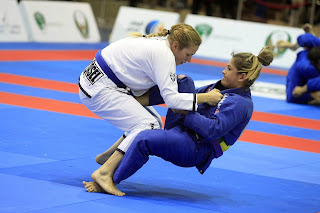By Liz
I’m totally exhausted at the end of every training session. How do I keep from getting injured or burning out?
I’m totally exhausted at the end of every training session. How do I keep from getting injured or burning out?
Developing a long-term training plan and sustainable jiujitsu practice is key to ensuring that we can keep practicing jiujitsu into our eighties as Renzo Gracie did.
I’ve recently noticed a few patterns with the female cohort at my gym. First, I know several women who have recently been injured or been completely exhausted by jiujistu. A couple of my friends even had to take several months off from jiujitsu because, in their own words, “I’m just completely burned out mentally and physically by jiujitsu.” See Meg’s own post about this.
Second, among the women there are ego flare-ups—for example, blue belts getting resentful after a white belt taps them, or white belts going too hard with other white belts.
I’ve had conversations that uncomfortably cross into the realm of, “She always taps me out,” or “At least I tapped her out.”
Since when did jiujitsu become all about tapping or getting tapped?
I have to admit that I’m definitely guilty of all of these habits. Once I trained so much that I barely had any energy to walk up the stairs in my house. Other times I found myself unmotivated to go to the gym, or else just completely bored during randoori sessions as I repeated the armbar-triangle pattern over and over again.
There is a white belt who regularly taps me during training. There is another white belt whose guard I cannot pass. There is another white belt I still haven’t been able to tap. During those sessions, I often get frustrated by this and react by either spazzing out on them, pulling back and getting completely passive, or just bottling it up and crying in the shower later.
I realized recently that if I kept holding on to these habitual attitudes--burning out and getting frustrated--it wouldn’t be long before I either got injured or quit jiujitsu.
What I mean by “sustainable jiujitsu” is training such that we don’t get injured or burned out easily. We can develop skills so that we train as much as possible for as long as possible. Jiujitsu is meant to be a life-long sport, but it’s necessary to practice some skills to ensure you keep practicing for years to come. Here are some tips:
• Take days off.
• Get enough sleep.
• Eat clean.
• Every session doesn’t need to be war.
• It’s okay to tap out. It’s okay to get your guard passed.
• You don’t need to submit people all the time. Sometimes it’s good to practice new moves instead of always going for the tap.
• Focus on learning and practicing new things. If we’re always doing the same move from the same position, we’re going to get bored really fast.
• Keep your ego out of it. Practice detaching from the outcome. You will take all the fun out of it, and probably end up getting injured or burned out, if you focus on who tapped out who, how often, and when.
• There is a time and a place for focusing on getting submissions: competition and competition training. If your gym doesn’t have specified competition-training classes, you can set aside one or two days a week during free sparring randoori to focus on getting submissions.
• Remember the point of jiujitsu is to learn new things, improve on those things, help others improve, to challenge ourselves, and to have fun. Focusing on submissions all the time can take these goals out of it for both you and your partner.
• Remember respect for the people who try new things, not the ones who are just beating up the lower belts. If we can cultivate a culture of helping each other and learning rather than one of aggression and defeat, we can ensure that jiujitsu becomes a long-term practice no matter our age.
• This post is not meant to advocate being lazy either. It’s always good to keep challenging yourself in terms of technique, speed, and strength. I am advocating for pushing yourself as hard as you can, but with an appropriate balance between focusing on getting submissions, while also learning new techniques in the process.
Sustainable jiujitsu practice requires maintaining a delicate and tricky balance of challenging yourself mentally and physically, while also recognizing your limits.
Some days I’m so mentally burned out with adrenaline from the stress of work that all I can do is turn my brain off and go as hard as I can by using the techniques I know best. Some days I’m so physically burned out that all I want to do is hang out in bottom of guard and try the new sweep-submission combo from lasso guard. There is no right or wrong way to go about this. The point is to make sure that we are staying aware of our mental and physical limits and having fun while we’re at it.
Liz started jiujitsu in 2011, got her blue belt in 2013, and has competed in 11 competitions.






